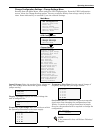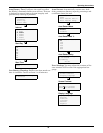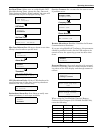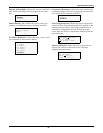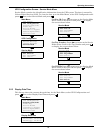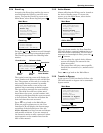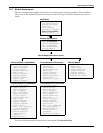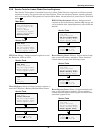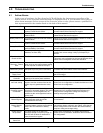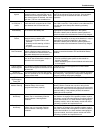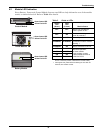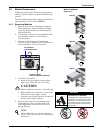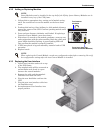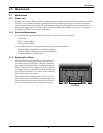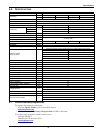
Troubleshooting
31
4.0 TROUBLESHOOTING
4.1 Active Alarms
In the event of an alarm, the User Interface LCD will display the last message regardless of the
default screen. A list of possible alarm messages is displayed below. If you encounter one of these or
other alarm messages and are unsure of the corrective action to take, please contact a qualified Lie-
bert representative at the number listed on the back of this manual.
User Interface Text Cause Action
Main Control Failure The Nfinity system has detected a
System Control Module failure.
Identify and replace the failed System Control Module or
contact Liebert Global Services for support.
Power Module Fail The Nfinity system has detected a Power
Module failure.
Identify and replace the failed Power Module or contact
Liebert Global Services for support.
Battery Module Fail The Nfinity system has detected a Battery
Module failure.
Identify and replace the failed Battery Module or contact
Liebert Global Services for support.
Redun. Control Fail The Nfinity system has detected a
System Control Module failure.
Identify and replace the failed System Control Module or
contact Liebert Global Services for support.
Battery Card Failure The Nfinity system has detected an
Intellislot Battery Card failure.
Identify and replace the failed Intellislot Battery Card or
contact Liebert Global Services for support.
UPS On Battery The Nfinity is drawing power from the
batteries, not from utility.
Verify input breaker is closed. Verify input voltage is
present and correct voltage. Verify input frequency is
correct.
Reminder alarm -
Check air filter
The fan filter reminder time has elapsed. Check and clean the fan filter and acknowledge the alarm.
This alarm may be disabled or the interval between these
alarms can be configured via the User Interface.
Short Circuit
Recovery - Please
Wait
User tried to turn the output on following a
short circuit on the output without waiting
for the required 30 seconds to expire.
Wait for at least 30 seconds and then turn the output on.
Power Module N+1
Redundancy Alarm
Number of power modules is not
adequate to provide power redundancy.
Reduce the UPS’s load, add power modules to the frame
or disable the alarm feature via the User Interface.
Output Off - Output
Short Circuit
A short circuit was detected on the output. Correct short (or extreme overload condition) and turn on
the UPS’s output.
UPS Output
Overload
The load on the Nfinity exceeded the
capacity of the active power modules.
Reduce the UPS’s load or add power modules.
Output exceeds
max load setting
This will occur if the max load alarm is
enabled, and the measured load at the
UPS’s output is greater than the value
set.
Reduce the UPS’s load, increase the Maximum Load
Alarm limit via configuration or disable the Maximum Load
Alarm limit via configuration.
Output Off-
Overload, bypass
unavailable
Normally a severe overload will cause the
unit to go to automatic bypass. This event
informs the user that bypass was not
qualified so the unit dropped the load to
protect itself.
Reduce the UPS’s output load and verify that the UPS’s
bypass source is qualified (amplitude and frequency).
Verify that the configuration voltage and frequency
settings are properly selected.
Switch To
Manual Bypass
The Nfinity is on automatic bypass.
Manual bypass switch should be
activated before servicing.
Transfer Nfinity to manual bypass and call Liebert service
for assistance.
Load Exceeds
Battery Module
Capacity
The measured load on the output will
cause the battery modules to exceed their
limits if the UPS transfers to battery
mode.
Reduce the UPS’s load or add battery capacity. If external
non-modular battery cabinet(s) are added, verify that the
UPS’s configuration is set to match the external battery
amp-hour rating and charger rating.
Bypass source
not qualified
The input voltage is not within the
specified voltage or frequency range so
the UPS will not allow an automatic or
manual transfer to bypass.
Verify UPS’s configuration for voltage and frequency.
Check UPS’s input breaker; disable this alarm if desired
via configuration.
Load exceeds
frame limit
Load is greater then the rated frame limit. Reduce the UPS’s load.



